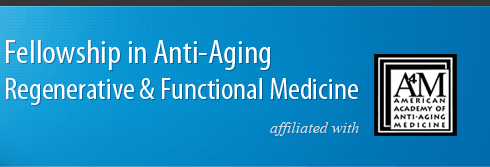Fellowship Modules Online
- Easy to use online video sessions
- Same experts as live modules
- Same material as live sessions
- Learn from your home or office
- Avoid travel expenses
- Save time and money
Upcoming Live Modules
October 12-14, 2012
Marriott Tampa Waterside
Tampa, FL
November 1-3, 2012
Atlanta Marriott Marquis
Atlanta, GA
December 13-15, 2012
Venetian Las Vegas
Las Vegas, NV
Module I: A Metabolic, Anti-Aging and Functional Approach to Endocrinology
Upon completion of this module, the participants will:
- Recognize the hormonal changes that women and men manifest with aging
- Discuss the functions of estrogen, progesterone, testosterone, and DHEA in the body
- Know the structure of the sex hormones and their metabolism
- Understand the intricate web that the hormones are in the body
- Discuss the risks and benefits of estrogen, progesterone, testosterone, DHEA, pregnenolone and melatonin
- Know the symptoms of estrogen, progesterone, testosterone, and DHEA loss
- Learn the symptoms of estrogen, progesterone, testosterone, and DHEA excess
- Understand the differences between synthetic and bio-identical hormones
- Review the literature on synthetic, bio-identical hormone replacement
- Understand the adrenal system and its affects on other sex hormones and hormone replacement
- Initiate or suggest hormone replacement treatment
- Understand reasons bio-identical hormone replacement should be considered
- Monitor treatment, adjust dosages, alleviate side effects of BHRT
- Recognize the clinical manifestations of hypothyroidism
- Know the factors that cause decreased production of T4, affect 5'diodinase production, cause an inability to convert T4 to T3, and causes associated with decreased T3 or increased reverse T3
- Learn factors that increase the conversion of T4 to T3
- Understand the crucial role that iodine has in the function of the thyroid gland
- Prescribe or suggest treatment for hormone replacement including compounded thyroid medications
- Review of the key signs and symptoms of adrenal fatigue
- Know the physical examination findings present in adrenal fatigue
- Learn the laboratory test that aid in the diagnosis of adrenal fatigue
- Discuss the Women's Health Initiative findings and its clinical implications
- Understand the limitations of serum testing for steroid hormone levels and FSH
- Understand the importance of measuring tissue level of hormones, in diagnosing hormonal imbalances and in monitoring bio-identical hormone replacement
- Understand the impact of stress on the body
- Understand the physiology of the stress response
- Learn what tests best measures the physiologic response to stress
- Understand how to identify and treat adrenal dysfunction
- Understand how stress effects the cardiovascular system, insulin resistance, immune dysfunction, neurotransmitter balance, hormone balance, and thyroid function
- Review information on safe and effective therapies to correct adrenal dysfunction
- Discuss innovative testing that identifies thyroid dysfunction when TSH is normal
- Differentiate between progesterone and synthetic progestins relating to structure, pharmacologic actions and risks
- Explain the literature concerning the risk of breast cancer as it relates to differences in progesterone and synthetic progestins
- Explain research and clinical studies suggesting that progesterone therapy protects against breast cancer
- Discuss the advantages and disadvantages of testing hormone levels in different body fluids
- Discuss the methodology of scientific support for, and the differences in saliva, urine and blood testing of hormones
- Present scientific and clinical studies that suggest conventional venipuncture serum testing underestimates tissue uptake of sex-steroids delivered topically
- Be familiar with the basis of steroid synthesis
- Understand the urine monitoring of hormone levels and metabolites. Specific algorithms will be shared to facilitate ease of use in clinical practice
- Know the hormonal changes that occur with aging in males
- Know the cardiovascular, cognitive, bone, sexual, and emotional effects of hormone depletion and hormone restoration in males
- Learn to monitor and restore optimal hormone levels in males
- Discuss the differences between compounding and manufacturing medications
- Review the various licensure needs to compound medications
- Discuss the various patient care areas that involve specialized compounding
- Review various medication dosage forms that can be compounded
- Discuss the various types of equipment needed in compounding
- Learn how to evaluate a patient for iodine deficiency
- Review the roles iodine plays in the body
- Discover how to treat iodine deficiency
- Recognize the symptoms of PMS
- Study treatment modalities for PMS
- Learn the criterion required to make the diagnosis of PCOS
- Learn conventional and metabolic treatments for PCOS
- Learn the different bases that hormones can be placed in along with their advantages and disadvantages







